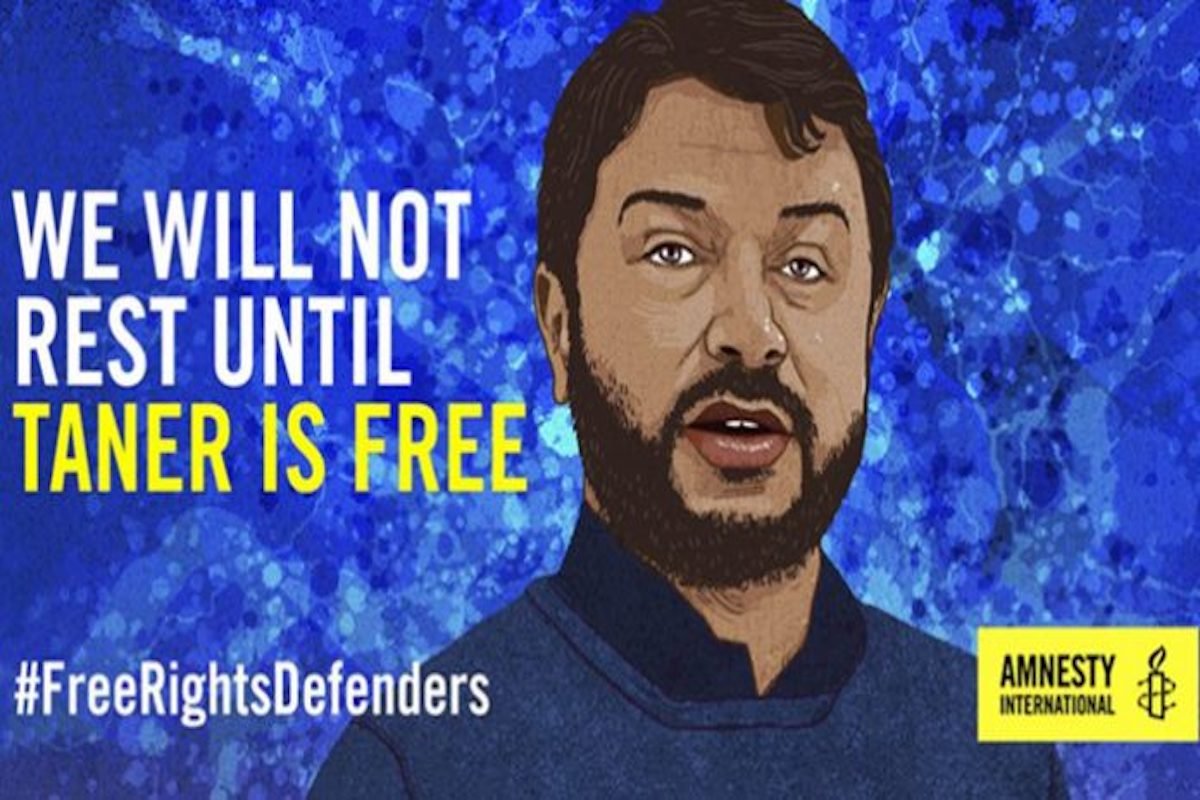A Turkish court in İzmir has ruled for the continuation of the pre-trial detention of Taner Kılıç, chair of the board of Amnesty International’s Turkey on Wednesday.
Kılıç, a lawyer and a founding member of AI Turkey and chairman of its board of directors since 2014, was arrested by an İzmir court on June 9, 2017 as part of Turkish government’s massive post-coup witch hunt campaign targeting the alleged members of the Gülen movement.
Kılıç testified before İzmir 16th Assize Court in which he was standing trial on the charge of “financing terrorism and spying,” before the other 10 rights advocates were detained during the workshop in Büyükada and were arrested later. Kılıç was included in the indictment of Büyükada lawsuit later as a suspect.
Although having argued, that he had been behind bars on the day of the workshop in Büyükada, his case was combined with the main Büyükada Case in which the other 10 rights defenders are standing trial and he is being charged with “being a member of an armed terrorist organisation.”
According to a report by Bianet, stating that it is usual for NGOs to frequently organize meetings similar to the one they held in Büyükada, Kılıç said that the fact that a meeting is not held public, does not mean that it could be considered illegal. Saying that he knew since April 2017 that this meeting was being planned and noted that he did know any details other than rights defender İdil Eser, Amnesty International Turkey Office Director, would attend the meeting on behalf of Amnesty International
Denying the claims that “Eser had to attend the hearing as he was in jail,” Kılıç criticised pro-government media for aiming at criminalizing the rights defenders. Kılıç also reminded that the documents and reports confuted the accusations against him. “As Executive Board of Amnesty International, together with all our employees, we do not only work under the regulations of Turkey but also under other international monitoring mechanisms. Amnesty International cannot take part in any activity that could be linked with criminal organisations. My connection to İdil Eser, as described in the indictment, is a necessity considering my position as manager of the association,” said Kılıç.
Referring to the accusations against him that he was “a member of an armed terrorist organisation,” Kılıç said that the indictment did not include any information about what he did in particular and only claimed that he used ByLock mobile phone messaging application and he had deposited money to Bank Asya which was closed by Turkish government in aftermath of a controversial coup attempt on July 15, 2016 over its affiliation with the Gülen movement.
Turkish authorities believe that ByLock is a communication tool among the alleged followers of the Gülen movement. Tens of thousands of people, including civil servants, police officers, soldiers, businessmen and even housewives, have either been dismissed or arrested for using ByLock since the failed coup attempt on July 15, 2016.
“Through reports and documents in my file, it has been proved that these accusations were not true”, Kılıç said and added that “Together with 24 others […] I am staying in a ward that is supposed to be for only 8 people, and I demand that my unjust treatment be ended.”
Kılıç was also heard in the second hearing of the trial of the 11 rights defenders who were detained due to a training workshop on digital security held in Büyükada island off İstanbul on July 5, 2017 was held on Wednesday before the İstanbul 35th Assize Court.
All the rights defenders who had been released pending trial, attended the hearing, except the two rights defenders Peter Steudtner (German citizen) and Ali Garawi (citizen of Sweeden), who were released on the first hearing as well and had left the country the next day, on October 26, 2017.
The hearing began with Kılıç’s statement of defense that he made via Audio and Visual Information System (SEGBİS). Following Kılıç, Nejat Taştan and Şeyhmus Özbekli made their statements of defence.
“We are being tried over advocating for rights,” said Nejat Taştan in his testimony before the court and said that “Despite out countless requests, the prosecution refused any evidence that would be in our favor.”
Addressing the accusations in the indictment, Taştan stated that although he had explained to the prosecution countless times, that the claims that he had contacted a person who was a ByLock user, were groundless and that the mentioned phone number did not even belong to him. Taştan was released on probation with an international travel ban in the first hearing of the trial on July 25.
Şeyhmus Özbekli has also said in his testimony before the court that “I am 24 years old and was working actively in Diyarbakır Bar Association for three months. I attended the meeting on behalf of the Rights Initiative that was set up by a group of rights defenders from MAZLUMDER (Association of Human Rights and Solidarity with the Oppressed), in the last weeks of my internship… In the indictment it is claimed that ‘we were planning a second Gezi Insurgence’. I don’t even know where Gezi Park is… I am a lawyer with a fresh career. My only purpose is to advocate for human rights, same as other colleagues here who sit on the defendants’ stand.
In the second session of the hearing after the break, the court heard IT expert Koray Peksayar who examined Taner Kılıç’s phone. Prosecutor Selahattin Kanbur demanded that Kılıç remain in detention pending trial. Announcing its interim judgement, the court ruled that Kılıç’s detention pending trial to be extended. The court also ordered to revoke judicial probe for all the defendants of the case, and an anonymus witness be heard. The Next hearing will be on January 30, 2018.
On July 5, 2017 Turkish police, acting on an anonymous tip, raided a hotel on Büyükada, one of the Princes’ Islands off İstanbul, and detained Eser from AI, İlknur Üstün from the Women’s Coalition, lawyer Günal Kurşun from the Human Rights Agenda Association, lawyer Nalan Erkem from the Citizens Assembly, Nejat Taştan from the Equal Rights Watch Association, Özlem Dalkıran from the Citizens’ Assembly, lawyer Şeyhmus Özbekli, Veli Acu from the Human Rights Agenda Association and two foreign trainers, Ali Garawi and Peter Steudtner.
An İstanbul court on Oct. 25, 2017 ruled to release eight of the human rights activists, including Eser, who had been in pretrial detention since July 5 on alleged terror links. Four other suspects are also being tried as part of same case but are free on their own recognizance. Kılıç had remained in pretrial detention after a court in İzmir on Oct. 26 declined to grant his release.
Turkey survived a controversial military coup attempton July 15, 2016 that killed 249 people. Immediately after the putsch, the Justice and Development Party (AKP) government along with Turkey’s autocratic President Recep Tayyip Erdoğan pinned the blame on the Gülen movement.
Fethullah Gülen, who inspired the movement, strongly denied having any role in the failed coup and called for an international investigation into it, but President Erdoğan — calling the coup attempt “a gift from God” — and the government initiated a widespread purge aimed at cleansing sympathizers of the movement from within state institutions, dehumanizing its popular figures and putting them in custody.
Turkey has suspended or dismissed more than 150,000 judges, teachers, police and civil servants since July 15, 2016. Turkey’s Justice Ministry announced on July 13 that 50,510 people have been arrested and 169,013 have been the subject of legal proceedings on coup charges since the failed coup.
















